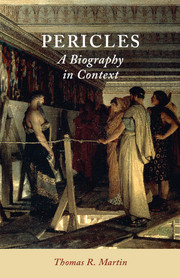Book contents
- Frontmatter
- Dedication
- Epigraph
- Contents
- List of Illustrations
- List of Maps
- Acknowledgments
- Chronology
- Pericles' Alcmeonid Family Tree
- Introduction: A Biography of Pericles in the Context of the Ancient Sources
- 1 The Notorious Family History of Pericles' Mother
- 2 The Harsh Lessons of the Career of Pericles' Father
- 3 Pericles Becomes a Teenager during a Family Crisis and a National Emergency
- 4 Pericles Becomes a Refugee during Athens' Greatest Peril
- 5 Pericles Becomes an Adult as Athens Builds an Empire
- 6 Pericles' Innovative Education for Leadership in Athenian Democracy
- 7 Pericles Becomes a Leader as Athens and Sparta Become Enemies
- 8 Pericles Becomes the First Man of Athens
- 9 Pericles' Responsibility for the Samian Revolt and the Peloponnesian War
- 10 Pericles' Fate, Then and Later
- Suggested Readings
- Index
7 - Pericles Becomes a Leader as Athens and Sparta Become Enemies
Published online by Cambridge University Press: 05 August 2016
- Frontmatter
- Dedication
- Epigraph
- Contents
- List of Illustrations
- List of Maps
- Acknowledgments
- Chronology
- Pericles' Alcmeonid Family Tree
- Introduction: A Biography of Pericles in the Context of the Ancient Sources
- 1 The Notorious Family History of Pericles' Mother
- 2 The Harsh Lessons of the Career of Pericles' Father
- 3 Pericles Becomes a Teenager during a Family Crisis and a National Emergency
- 4 Pericles Becomes a Refugee during Athens' Greatest Peril
- 5 Pericles Becomes an Adult as Athens Builds an Empire
- 6 Pericles' Innovative Education for Leadership in Athenian Democracy
- 7 Pericles Becomes a Leader as Athens and Sparta Become Enemies
- 8 Pericles Becomes the First Man of Athens
- 9 Pericles' Responsibility for the Samian Revolt and the Peloponnesian War
- 10 Pericles' Fate, Then and Later
- Suggested Readings
- Index
Summary
In about 464, not long after the Thasian envoys arrived to persuade the Spartans to attack Athens, a giant earthquake devastated Sparta. The seismic shock knocked down almost every building in town, crushing countless people. The helots, the massive slave population that the Spartans kept under oppressive control across the southern Peloponnese, seized the moment to rebel, and very violently. They were joined by some of the Greeks from Laconia (Sparta's territory) called perioikoi (“those who live around [us]”), who were dominated, but not enslaved, by the Spartans. The rebels slaughtered their oppressors among the ruins of Sparta and then established a fortified settlement on Mt. Ithome in Messenia to the west. Forced to fight to preserve their very existence, the Spartans could not fulfill their promise to the Thasians to invade Athenian territory.
As a result, the islanders found themselves on their own in their besieged city. By probably 462 (the chronology of all the events being narrated here for the late 460s is debatable), the citizens of Thasos had to surrender to the Athenian-led attackers. The treatment of the defeated islanders was harsh. They had to turn over their navy, their mines, and their territory on the mainland to the Delian League and demolish their fortification wall (Figure 12). Despite being deprived of the revenue from their former mineral resources and commercial outposts, they also had to pay a large fine and then resume their payments to the alliance. In evaluating the fate of Thasos, it is necessary to recognize that the Athenians had not acted alone but in company with other league members and that it was both appropriate and necessary to compel the rebel Thasians because they had originally sworn a sacred oath never to leave the alliance. For that reason, the citizens of Athens as the leaders of the Delian League surely saw their actions as justified in enforcing the strict letter of the law, as it were.
At the same time, however, it is also likely that the rebellion of Thasos involved a dispute with Athens centering on a competition for riches and resources. Taking over Thasians' mines of precious metal and gaining control of the exploitation of and international trade in the extensive mineral resources of Thrace seem to have laid the financial base for Athens' growing prosperity during the middle decades of the fifth century.
- Type
- Chapter
- Information
- PericlesA Biography in Context, pp. 139 - 158Publisher: Cambridge University PressPrint publication year: 2016



